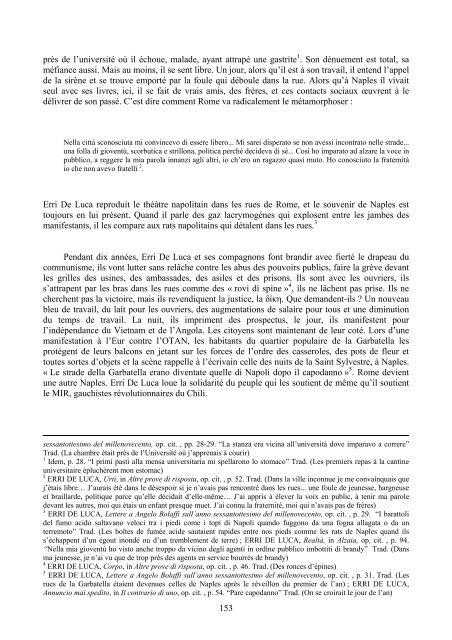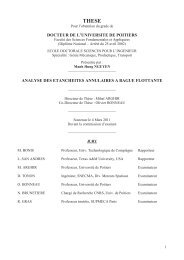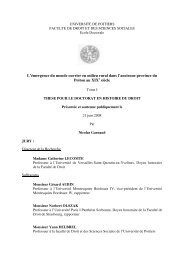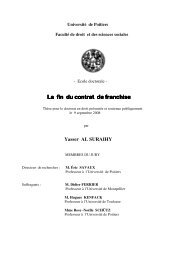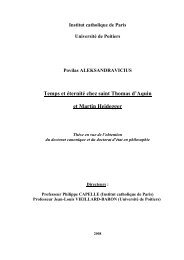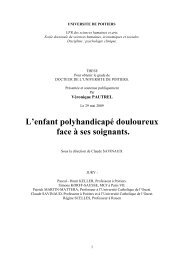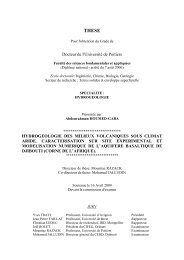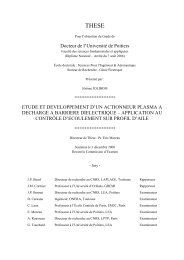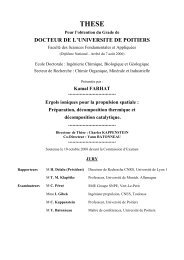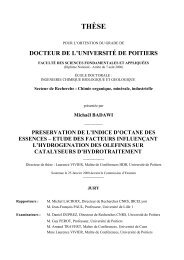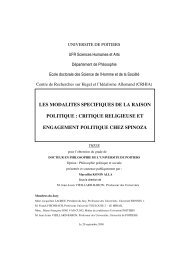Consulter le texte intégral de la thèse - Université de Poitiers
Consulter le texte intégral de la thèse - Université de Poitiers
Consulter le texte intégral de la thèse - Université de Poitiers
Create successful ePaper yourself
Turn your PDF publications into a flip-book with our unique Google optimized e-Paper software.
près <strong>de</strong> l’université où il échoue, ma<strong>la</strong><strong>de</strong>, ayant attrapé une gastrite 1 . Son dénuement est total, sa<br />
méfiance aussi. Mais au moins, il se sent libre. Un jour, alors qu’il est à son travail, il entend l’appel<br />
<strong>de</strong> <strong>la</strong> sirène et se trouve emporté par <strong>la</strong> fou<strong>le</strong> qui débou<strong>le</strong> dans <strong>la</strong> rue. Alors qu’à Nap<strong>le</strong>s il vivait<br />
seul avec ses livres, ici, il se fait <strong>de</strong> vrais amis, <strong>de</strong>s frères, et ces contacts sociaux œuvrent à <strong>le</strong><br />
délivrer <strong>de</strong> son passé. C’est dire comment Rome va radica<strong>le</strong>ment <strong>le</strong> métamorphoser :<br />
Nel<strong>la</strong> città sconosciuta mi convincevo di essere libero... Mi sarei disperato se non avessi incontrato nel<strong>le</strong> stra<strong>de</strong>...<br />
una fol<strong>la</strong> di gioventù, scorbutica e strillona, politica perché <strong>de</strong>ci<strong>de</strong>va di sé... Così ho imparato ad alzare <strong>la</strong> voce in<br />
pubblico, a reggere <strong>la</strong> mia paro<strong>la</strong> innanzi agli altri, io ch’ero un ragazzo quasi muto. Ho conosciuto <strong>la</strong> fraternità<br />
io che non avevo fratelli 2 .<br />
Erri De Luca reproduit <strong>le</strong> théâtre napolitain dans <strong>le</strong>s rues <strong>de</strong> Rome, et <strong>le</strong> souvenir <strong>de</strong> Nap<strong>le</strong>s est<br />
toujours en lui présent. Quand il par<strong>le</strong> <strong>de</strong>s gaz <strong>la</strong>crymogènes qui explosent entre <strong>le</strong>s jambes <strong>de</strong>s<br />
manifestants, il <strong>le</strong>s compare aux rats napolitains qui déta<strong>le</strong>nt dans <strong>le</strong>s rues. 3<br />
Pendant dix années, Erri De Luca et ses compagnons font brandir avec fierté <strong>le</strong> drapeau du<br />
communisme, ils vont lutter sans relâche contre <strong>le</strong>s abus <strong>de</strong>s pouvoirs publics, faire <strong>la</strong> grève <strong>de</strong>vant<br />
<strong>le</strong>s gril<strong>le</strong>s <strong>de</strong>s usines, <strong>de</strong>s ambassa<strong>de</strong>s, <strong>de</strong>s asi<strong>le</strong>s et <strong>de</strong>s prisons. Ils sont avec <strong>le</strong>s ouvriers, ils<br />
s’attrapent par <strong>le</strong>s bras dans <strong>le</strong>s rues comme <strong>de</strong>s « rovi di spine » 4 , ils ne lâchent pas prise. Ils ne<br />
cherchent pas <strong>la</strong> victoire, mais ils revendiquent <strong>la</strong> justice, <strong>la</strong> δίκη. Que <strong>de</strong>man<strong>de</strong>nt-ils ? Un nouveau<br />
b<strong>le</strong>u <strong>de</strong> travail, du <strong>la</strong>it pour <strong>le</strong>s ouvriers, <strong>de</strong>s augmentations <strong>de</strong> sa<strong>la</strong>ire pour tous et une diminution<br />
du temps <strong>de</strong> travail. La nuit, ils impriment <strong>de</strong>s prospectus, <strong>le</strong> jour, ils manifestent pour<br />
l’indépendance du Vietnam et <strong>de</strong> l’Ango<strong>la</strong>. Les citoyens sont maintenant <strong>de</strong> <strong>le</strong>ur coté. Lors d’une<br />
manifestation à l’Eur contre l’OTAN, <strong>le</strong>s habitants du quartier popu<strong>la</strong>ire <strong>de</strong> <strong>la</strong> Garbatel<strong>la</strong> <strong>le</strong>s<br />
protègent <strong>de</strong> <strong>le</strong>urs balcons en jetant sur <strong>le</strong>s forces <strong>de</strong> l’ordre <strong>de</strong>s cassero<strong>le</strong>s, <strong>de</strong>s pots <strong>de</strong> f<strong>le</strong>ur et<br />
toutes sortes d’objets et <strong>la</strong> scène rappel<strong>le</strong> à l’écrivain cel<strong>le</strong> <strong>de</strong>s nuits <strong>de</strong> <strong>la</strong> Saint Sylvestre, à Nap<strong>le</strong>s.<br />
« Le stra<strong>de</strong> <strong>de</strong>l<strong>la</strong> Garbatel<strong>la</strong> erano diventate quel<strong>le</strong> di Napoli dopo il capodanno » 5 . Rome <strong>de</strong>vient<br />
une autre Nap<strong>le</strong>s. Erri De Luca loue <strong>la</strong> solidarité du peup<strong>le</strong> qui <strong>le</strong>s soutient <strong>de</strong> même qu’il soutient<br />
<strong>le</strong> MIR, gauchistes révolutionnaires du Chili.<br />
sessantottesimo <strong>de</strong>l mil<strong>le</strong>novecento, op. cit. , pp. 28-29. “La stanza era vicina all’università dove imparavo a correre”<br />
Trad. (La chambre était près <strong>de</strong> l’<strong>Université</strong> où j’apprenais à courir)<br />
1<br />
I<strong>de</strong>m, p. 28. “I primi pasti al<strong>la</strong> mensa universitaria mi spel<strong>la</strong>rono lo stomaco” Trad. (Les premiers repas à <strong>la</strong> cantine<br />
universitaire épluchèrent mon estomac)<br />
2<br />
ERRI DE LUCA, Urti, in Altre prove di risposta, op. cit. , p. 52. Trad. (Dans <strong>la</strong> vil<strong>le</strong> inconnue je me convainquais que<br />
j’étais libre… J’aurais été dans <strong>le</strong> désespoir si je n’avais pas rencontré dans <strong>le</strong>s rues... une fou<strong>le</strong> <strong>de</strong> jeunesse, hargneuse<br />
et brail<strong>la</strong>r<strong>de</strong>, politique parce qu’el<strong>le</strong> décidait d’el<strong>le</strong>-même… J’ai appris à é<strong>le</strong>ver <strong>la</strong> voix en public, à tenir ma paro<strong>le</strong><br />
<strong>de</strong>vant <strong>le</strong>s autres, moi qui étais un enfant presque muet. J’ai connu <strong>la</strong> fraternité, moi qui n’avais pas <strong>de</strong> frères)<br />
3<br />
ERRI DE LUCA, Lettere a Angelo Bo<strong>la</strong>ffi sull’anno sessantottesimo <strong>de</strong>l mil<strong>le</strong>novecento, op. cit. , p. 29. “I barattoli<br />
<strong>de</strong>l fumo acido saltavano veloci tra i piedi come i topi di Napoli quando fuggono da una fogna al<strong>la</strong>gata o da un<br />
terremoto” Trad. (Les boîtes <strong>de</strong> fumée aci<strong>de</strong> sautaient rapi<strong>de</strong>s entre nos pieds comme <strong>le</strong>s rats <strong>de</strong> Nap<strong>le</strong>s quand ils<br />
s’échappent d’un égout inondé ou d’un tremb<strong>le</strong>ment <strong>de</strong> terre) ; ERRI DE LUCA, Realtà, in Alzaia, op. cit. , p. 94.<br />
“Nel<strong>la</strong> mia gioventù ho visto anche troppo da vicino <strong>de</strong>gli agenti in ordine pubblico imbottiti di brandy” Trad. (Dans<br />
ma jeunesse, je n’ai vu que <strong>de</strong> trop près <strong>de</strong>s agents en service bourrés <strong>de</strong> brandy)<br />
4<br />
ERRI DE LUCA, Corpo, in Altre prove di risposta, op. cit. , p. 46. Trad. (Des ronces d’épines)<br />
5<br />
ERRI DE LUCA, Lettere a Angelo Bo<strong>la</strong>ffi sull’anno sessantottesimo <strong>de</strong>l mil<strong>le</strong>novecento, op. cit. , p. 31. Trad. (Les<br />
rues <strong>de</strong> <strong>la</strong> Garbatel<strong>la</strong> étaient <strong>de</strong>venues cel<strong>le</strong>s <strong>de</strong> Nap<strong>le</strong>s après <strong>le</strong> réveillon du premier <strong>de</strong> l’an) ; ERRI DE LUCA,<br />
Annuncio mai spedito, in Il contrario di uno, op. cit. , p. 54. “Pare capodanno” Trad. (On se croirait <strong>le</strong> jour <strong>de</strong> l’an)<br />
153


